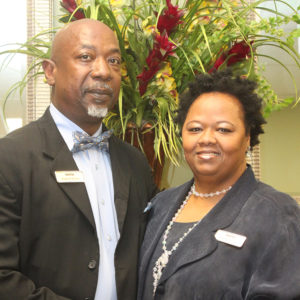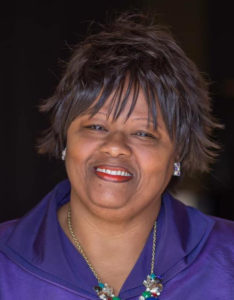By PAULINE ROGERS

From prisoner to reformer
I grew up in rural Vancleave on the Mississippi Gulf Coast as a chubby girl with low self-esteem, the oldest of 11 siblings. My first experience in a courtroom was at the age of 9, testifying about my father’s death, which I’d witnessed at the hands of my mother in self-defense. I’d helped her put him in the car, and he’d died en route to the hospital.
After my father’s death, my mother became a workaholic and was rarely around. We were with my grandmother and mom’s baby sister most of the time. My grandmother, a devout Christian, instilled in me that the older was responsible for the younger. I took this literally. We were poor and didn’t always have sufficiency. I would look at funeral announcements in the newspaper. I would dress up my siblings and take them to the church, not to grieve but to get to the repast, where we could always get food.
It wasn’t long after that I began stealing simple things to help provide for me and my family’s needs and desires. I stole from department stores, dollar stores, grocery stores, outlet malls … anything within walking distance.
I was 11 the first time I was caught. The police officer pulled me aside, explained that I shouldn’t steal, paid for the stolen goods, drove me home and gave me $7. But that didn’t teach me a lesson. I was arrested several more times after that without serious consequences. However, in my late 20s, I was looking at a six-year sentence with the state, and life as a habitual offender with the federal government.
Sitting in a county jail before I went to prison, I met a volunteer who introduced me to Jesus. That turned everything around: I was the same me, but I felt new. I repented and asked Jesus into my heart. Although locked up, I felt free.
By the time I got to the Central Mississippi Correctional Facility, scared and not knowing anything about prison besides what I’d seen on television, I was intent on practicing good behavior and coming home.
Wendy Hatcher, the first female chaplain hired by the Mississippi Department of Corrections, said she noticed something special about me after I attended several of her Bible studies. I liked her a lot. I felt like I could trust her. She was intelligent and able to assist me in a lot of things.
She hired me to work for her. I helped her with standard assistant tasks like paperwork; however, she also let me assist with more nuanced duties, like ministering to other prisoners. If there was a death in an inmate’s family, Wendy would take me with her to meet with the prisoner to comfort them, while educating me at the same time.
I served three years of a six-year term. When I was released in 1987, Wendy let me live with her in Brandon. While living with Wendy over the next four years, I was hired by an OB-GYN named Dr. Beverly McMillan — a special events speaker whom I’d met when I was in prison. Her office administrator, Patricia McNulty, hired me to work as a maid in Dr. McMillan’s office. After I proved myself, my responsibilities grew, and I worked there for the next 27 years.
I married my husband, Frederick, two years after he was released from almost 16 years of incarceration. We started our own ministry to others coming out of prison because of the needs we’d witnessed firsthand. Our 501(c)(3) is the Reaching and Educating for Community Hope (RECH) Foundation, with the Wendy Hatcher Transitional Home and three other transitional homes on a 27-acre reentry campus; the MORE (Mississippi Offender Reentry Establishment) training initiative; plus several other ministries under the RECH umbrella.
I wanted to name a home after Wendy Hatcher to honor her impact on my life.
We have assisted thousands over the years, both male and female, and housed two men and hundreds of women, with 31 years of zero recidivism.
I once was an abused, lost girl with low self-esteem; now I’m the director of a ministry that reaches out to families like me. I can only say that my life is one of amazing transformation and amazing grace. I felt like an old, dirty, crusty, trampled penny on the ground that no one wanted to pick up. But one person saw value in that penny, picked it up, cleaned it up and added more pennies to it. Now I’m picking up more pennies, as the pennies are reflective of every person I meet.

Pauline Rogers is the founder and executive director of the Reaching & Educating for Community Hope (RECH) Foundation. She lives in Jackson with her husband, Frederick. They are very active in their local community and at New Horizon Church International. She has one son and two grandchildren. She is a criminal justice reform activist, advocate and consultant for Clergy for Prison Reform.

